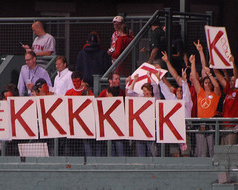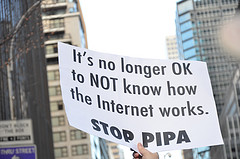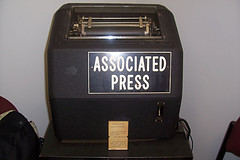Copyright 2007-25 Digital Media Law Project and respective authors. Except where otherwise noted,
content on this site is licensed under a Creative Commons Attribution-Noncommercial-ShareAlike 3.0 License: Details.
Use of this site is pursuant to our Terms of Use and Privacy Notice.
content on this site is licensed under a Creative Commons Attribution-Noncommercial-ShareAlike 3.0 License: Details.
Use of this site is pursuant to our Terms of Use and Privacy Notice.


 The issue of same-sex unions is hotly debated, and the discussion is heating up this election year with the case on California’s Proposition 8 making its way to the Supreme Court, and with President Obama recently declaring that he is in favor of same-sex marriage.
The issue of same-sex unions is hotly debated, and the discussion is heating up this election year with the case on California’s Proposition 8 making its way to the Supreme Court, and with President Obama recently declaring that he is in favor of same-sex marriage.
 Some of the most commercially successful and popular music of all time – including the entire catalog of The Beatles – is subject to a degree of uncertainty under current copyright law in the United States due to an anomaly in the federal copyright framework with respect to older sound recordings.
Some of the most commercially successful and popular music of all time – including the entire catalog of The Beatles – is subject to a degree of uncertainty under current copyright law in the United States due to an anomaly in the federal copyright framework with respect to older sound recordings. The nation's largest Internet service providers, in an unprecedented partnership with titans of the entertainment industry, have agreed to implement a uniform policy aimed at deterring online copyright infringement known as the
The nation's largest Internet service providers, in an unprecedented partnership with titans of the entertainment industry, have agreed to implement a uniform policy aimed at deterring online copyright infringement known as the  The DMLP recently appeared as an amicus curiae in Commonwealth v. Busa, a case brought in Boston Municipal Court under Massachusetts's anti-counterfeiting law,
The DMLP recently appeared as an amicus curiae in Commonwealth v. Busa, a case brought in Boston Municipal Court under Massachusetts's anti-counterfeiting law,  Earlier this week the CMLP (under its new name, the Digital Media Law Project) sought leave to file
Earlier this week the CMLP (under its new name, the Digital Media Law Project) sought leave to file  I'm not all that worried about YouTube's legal fate as such (I'm pretty sure Google can
I'm not all that worried about YouTube's legal fate as such (I'm pretty sure Google can  The All-Party Intellectual Property Group (APIP) in the United Kingdom
The All-Party Intellectual Property Group (APIP) in the United Kingdom  If there is a polar opposite to organizations like ours, it is the intellectual property troll. And in the IP troll heirarchy, one of the trolliest has long been Righthaven, the self-described "pre-eminent copyright enforcer" that sued hundreds of bloggers and other Internet denizens apparently as part of its business model. If the DMLP, the EFF, Public Citizen, and the like are the Justice League, Righthaven would be in the Secret Society of Supervillians.
If there is a polar opposite to organizations like ours, it is the intellectual property troll. And in the IP troll heirarchy, one of the trolliest has long been Righthaven, the self-described "pre-eminent copyright enforcer" that sued hundreds of bloggers and other Internet denizens apparently as part of its business model. If the DMLP, the EFF, Public Citizen, and the like are the Justice League, Righthaven would be in the Secret Society of Supervillians.
 By now you might have heard about
By now you might have heard about  The day of protest against the now (hopefully) infamous "Stop Online Piracy Act" (SOPA) and "Preventing Real Online Threats to Economic Creativity and Theft of Intellectual Property Act of 2011" (PROTECT IP Act, or PIPA) has ended.
The day of protest against the now (hopefully) infamous "Stop Online Piracy Act" (SOPA) and "Preventing Real Online Threats to Economic Creativity and Theft of Intellectual Property Act of 2011" (PROTECT IP Act, or PIPA) has ended.  Looking to make their brand “a little more memorable,” the News Licensing Group is now
Looking to make their brand “a little more memorable,” the News Licensing Group is now 
Description:
On June 2, 2012, attorney Charles Carreon sent a letter on behalf of FunnyJunk, LLC ("FunnyJunk") to Matthew Inman, creator of TheOatmeal.com, which threatened legal action on the basis of a May 2011 blog post by Inman titled "What should I do about FunnyJunk.com?".
In the post, Inman stated that he had discovered a number of his comics displayed without permission or attribution on FunnyJunk, and that he contacted FunnyJunk by email in an attempt to have them removed from the site. He claimed that FunnyJunk took down the images that were identified in the email, but that FunnyJunk had since "practically stolen [his] entire website and mirrored it on FunnyJunk." The post included screen shots of Inman's comics on FunnyJunk.com, and links to FunnyJunk image boards containing his work (as well as that of other artists that Inman alleged had been republished without permission).
A few days later, Inman posted an update that indicated FunnyJunk had removed some, but not all, of the content at issue.
The June 2 letter from FunnyJunk included a copy of Inman's original post, and alleged that statements made therein constituted a false accusation of willful copyright infringement. Thus, it stated, Inman "exposed [himself] to a lawsuit for defamation per se, in which damages are presumed." The letter also alleged that Inman had engaged in false advertising in violation of the Lanham Act. It concluded by demanding the immediate removal of all mentions of FunnyJunk from TheOatmeal.com and the payment of $20,000.
On June 11, 2012, Inman formally responded to the June 2 letter through his attorney, Venkat Balasubramani. The response letter denied FunnyJunk's claims that the original post was defamatory and constituted a violation of the Lanham Act. The response letter pointed out that FunnyJunk did not appear to have filed a notice of designation naming an agent as required of service providers who seek to rely on the Digital Milennium Copyright Act, placing FunnyJunk in a position where it might be held responsible for third-party infringements.
On June 12, 2012, Inman issued an informal response to the letter in a post entitled "FunnyJunk is threatening to file a federal lawsuit against me unless I pay $20,000 in damages," published on TheOatmeal.com. Inman included an annotated copy of the June 2 letter, and proposed that he would raise $20,000 in donations and donate the money to two charitable organizations: the National Wildlife Federation, and the American Cancer Society. A link was provided to the fundraising website Indiegogo.com.
On June 15, 2012, Carreon filed a lawsuit in his own name against Inman, Indiegogo, Inc., the American Cancer Society, the National Wildlife Federation and 100 anonymous Internet users for their role in the fundraising effort. As of July 20, 2012, no further action appears to have been taken by FunnyJunk.